Renowned screen actor Charles Laughton played some of the most memorable cinematic characters ever: Captain Bligh, Quasimodo, Nero, Dr. Moreau, King Henry VIII, Captain Kidd, and Sir Alfred Robarts, just to name a few, but like most actors, he thought he’d like to direct. He’d had experience directing plays but wanted to helm a film that would make moviegoers "sit up straight again” at the theater and take notice. And, so when he became enthralled with David Grubb’s best-selling novel, The Night of the Hunter, Laughton decided he would make it into a film. Unfortunately, it was both a commercial and critical failure and Laughton never directed another movie before his death in 1962. Today, his The Night of the Hunter (1955) is regarded by critics as one of the best films of the 1950s. I’m sure a man with such an ironic sense of humor as Laughton’s would have found this somewhat depressing. 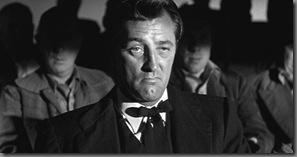
Set amidst the West Virginian countryside during the Great Depression, this is a movie that is one part gothic fairy tale and one part morality tale. It is written in 1 Timothy 6:10 that “the love of money is a root of all sorts of evil, and some by longing for it have wandered away from the faith and pierced themselves with many griefs.” This pretty much sums up ‘Reverend’ Harry Powell’s (Robert Mitchum) sociopathic existence. Plagued with a pathological disgust of women (calling Dr. Freud) but an insatiable need for money to bankroll his false prophesies, Harry finds himself compelled to kill widows. After being incarcerated for stealing a car, Harry shares a cell with a man (Peter Graves) sentenced to death for killing two people in a bank robbery where he stole $10,000 that was never recovered. Once released from prison Harry sets out to find the man’s widow and the missing money. The problem is the widow, Willa Harper (Shelley Winters), has no idea where the cash is stashed, but her t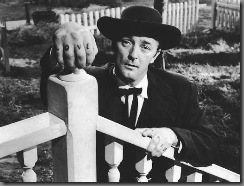 wo young children, John (Billy Chapin) and Pearl (Sally Jane Bruce), do but have promised never to reveal that it’s hidden in Pearl’s doll. What ensues is a true battle of good versus evil.
wo young children, John (Billy Chapin) and Pearl (Sally Jane Bruce), do but have promised never to reveal that it’s hidden in Pearl’s doll. What ensues is a true battle of good versus evil.
The Brothers Grimm and German expressionism obviously influenced Laughton’s vision of this film. James Agee is credited with the screen adaptation of Grubb’s novel, but in reality it was Laughton and his assistant directors, Terry and Denis Sanders, who wrote most of the script that ended up on the screen. Much like the novel, the film focuses on the duality of good and evil, which is quite literally etched on Harry’s knuckles, with one hand reading Love and the other one Hate. When a film starts off by quoting Matthew 7:15: “Watch out for false prophets. They come to you in sheep's clothing, but inwardly they are ferocious wolves,” and the next thing you see is a man in clerical garb, wearing a hat that looks like it has satanic horns, then you know this isn’t your everyday story of good versus evil. Somehow the fact that Harry is perceived as a man of God makes his evil ways even more dark and sinister—a fact that would have not been lost on the Brothers Grimm.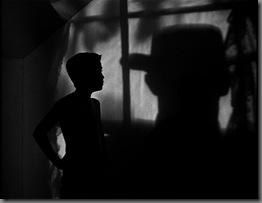
There are two particular shots in the film that are obvious nods to the likes of Fritz Lang and Robert Wiene, pioneers of the German Expressionistic movement. The first comes early in the film when John is telling Pearl a bedtime story about a bad man looking to do harm. Standing in a moonlit window as he relays the story, the boy finds himself silhouetted by the outline of a Puritanical hat belonging to a man singing his abased version of “Lean on Jesus” which he sings as “Leanin’”. When film teachers instruct students on the power of a good foreshadowing scene this is beyond an obvious choice. The other tip of the hat to Lang and Wiene comes in the bedroom scene where Harry kills Willa. By this point in the story, Willa has become  a brainwashed disciple of Harry and is so far gone that she can’t see him for the demon that he is, even when it is right in front of her face. As she prattles on about her spiritual shortcomings, the scene is framed in such a way to make the bedroom appear as a church (steeple included)—she quite literally can’t see behind the shadows of delusion.
a brainwashed disciple of Harry and is so far gone that she can’t see him for the demon that he is, even when it is right in front of her face. As she prattles on about her spiritual shortcomings, the scene is framed in such a way to make the bedroom appear as a church (steeple included)—she quite literally can’t see behind the shadows of delusion.
While the first half of the film is dedicated to the depiction of evil, the second half focuses primarily on good. This is where Lillian Gish comes into the story. Laughton desperately wanted Gish for the role of Mrs. Cooper and did what most could no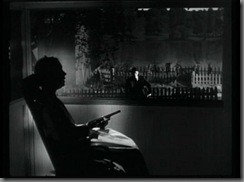 t do: he convinced her to come out of retirement and play what he thought was the lynchpin role of the film. Mrs. Cooper’s Christian compassion and charity are the perfect dichotomy to Harry’s greed and hatred. As she says, she is a “strong tree with branches for many birds.” Reminiscent of the Old Lady in the Shoe, Mrs. Cooper is the caretaker of orphaned children and she takes John and Pearl in when they run away from Harry. She is a formidable adversary to Harry, which is showcased in their pivotal showdown of wills and, well, religiosity. Never has there been a stranger duet than Harry singing “Leanin’” with Mrs. Cooper chiming in to sing the correct version of the song, “Lean on Jesus”. It is here that good and evil meet and only one can win—it helps that one brought a knife to a shotgun fight, though.
t do: he convinced her to come out of retirement and play what he thought was the lynchpin role of the film. Mrs. Cooper’s Christian compassion and charity are the perfect dichotomy to Harry’s greed and hatred. As she says, she is a “strong tree with branches for many birds.” Reminiscent of the Old Lady in the Shoe, Mrs. Cooper is the caretaker of orphaned children and she takes John and Pearl in when they run away from Harry. She is a formidable adversary to Harry, which is showcased in their pivotal showdown of wills and, well, religiosity. Never has there been a stranger duet than Harry singing “Leanin’” with Mrs. Cooper chiming in to sing the correct version of the song, “Lean on Jesus”. It is here that good and evil meet and only one can win—it helps that one brought a knife to a shotgun fight, though.
Mitchum campaigned hard for the role of ‘Reverend’ Harry and it shows in what is perhaps his finest performance. Cool and cunning, as well as evil and deranged, never looked so 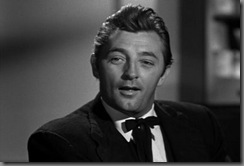 good on a man. There are very few actors who could pull off being both vile and charming, but Mitchum does it exceedingly well. It is a shame that he was overlooked by the Academy Awards, but perhaps the world of 1955 wasn’t ready for such a dark and disturbing film.
good on a man. There are very few actors who could pull off being both vile and charming, but Mitchum does it exceedingly well. It is a shame that he was overlooked by the Academy Awards, but perhaps the world of 1955 wasn’t ready for such a dark and disturbing film.
Overall, I enjoyed The Night of the Hunter. The story was gripping and Stanley Cortez’s photography was inspired. If I have one complaint about the film it has to be the character of Pearl. Was there ever a more helpless child in the world? If I had to see John drag her up steps or attempt to put her uncooperative self in a boat one more time I may have screamed., “O come ye little children indeed!”

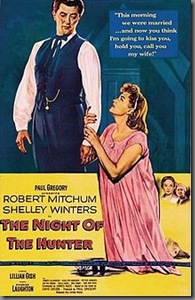
I have to admit I would probably rate this higher, as it is one of those films that, for me, are once seen and never forgotten. Mitchum is fearless and Miss Lillian matches him all the way.
ReplyDeleteI suspect many would agree with you, FC: I am stingy with my stars here. Still, a few things just push me away from rating it higher: the worthless sister and annoying Spoons jump to mind. I agree that Mitchum and Gish give fine performances, though.
DeleteMitchum plays one of the all-time great movie villains in this film. Good review of it. Like FlickChick I would rate this quite a bit higher.
ReplyDeleteWe've parted ways before, Chip, so I'm sure you aren't surprised. LOL
DeleteI'd give it a bump, too, but I completely understand the rating here. I'd boost the rating for the amazing performance of Mitchum. But I'd take some away for Pearl, because she drives me to distraction.
ReplyDeleteI'm glad to know I'm not the only person who had an issue with the sister.
DeleteFor me Night of the Hunter, is one of the scariest films ever made. Mitchum, gives an excellent performance. The suspense comes from the performance of the characters. Although, the film is warm and charming in parts, it is still keeps you at the edge of your seat..
ReplyDeleteIt does keep you on the edge of your seat, but I don't know if I can categorize it as scary.
DeleteIt's too bad Laughton would never know how later audiences would receive this film. Mitchum is so good in this movie it almost takes your breath away. It may not be a scary film, but it sure is creepy!
ReplyDeleteWithout a doubt this was Mitchum's finest career performance.
DeleteI have to say I would have rated it higher, Kim, but we all see movies in different ways. When I saw it as a young girl, and later learned it was an industry failure, I couldn't believe it. The performances, Laughton's directions, and your right-on description of the German expressionism look made it for me one of the best. Laughton's reaction to its release made me think I would probably feel the same way -- he gave his all and put a wonderful thing on screen, and was laughed at, from what I understand. What a shame.
ReplyDeleteThis is one of my favorites of your critiques, Kim, thoughtful and honest. Wonderful job.
Thanks, Becky. And, you're right, we definitely all see movies different ways. Still, I think Mitchum's performance is stellar.
DeleteKim,
ReplyDeleteWhile I have seen this film at least four times I didn't know or I just didn't recall that Laughton directed. Shame on me for that oversight!
It's interesting that certain films find their audience or a certain appreciation long after their original release. Perhaps a fickle audience during that time and it really is a shame that Mitchum was overlooked for an Oscar nod because if any one performance stood out in his long career, this was it. It surely gave him pause and a bit of sadness.
Thanks for your thoughtful review of a very good film. One that should be on anyone's must see list.
I hope you had a great holiday week.
Page
Page, good to see you here. I think Mitchum's performance gets so much attention that it is easy to forget about Laughton, so don't be ashamed. Had a great Turkey week, thanks.
Delete